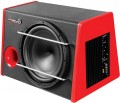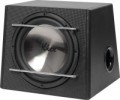Rated power
The average (root mean square — RMS) power of the input signal, at which the subwoofer is able to work continuously without negative consequences (damage, failure) for at least an hour. The rated power of the subwoofer must be greater than the power of the amplifier connected to it — in order to avoid overloads.
Max. power
The maximum signal power that the subwoofer is able to withstand for a short time (up to several seconds) without any negative consequences. When selecting an amplifier-subwoofer pair, it is recommended to take a subwoofer with a maximum power of at least twice the maximum power of the amplifier. In general, the higher the maximum power, the more resistant the subwoofer is to overloads.
Frequency range
The range of audio frequencies reproduced by the subwoofer. It is believed that the human ear is capable of perceiving a frequency range of the order of 16 – 20,000 Hz, but in this case note that the subwoofer is designed to reproduce the lower frequency band (up to 200 Hz). Accordingly, in the case of the lower limit of the range, everything is simple: “the lower, the better”; the upper one should not be lower than the lower limit of the main car audio — otherwise there will be "gaps" in the frequencies, which will affect the sound quality.
Sensitivity
Sensitivity determines the loudness of the subwoofer when a signal of a certain power is connected to it: with equal signal power and impedance (see below), the subwoofer with the higher sensitivity will sound louder.
Impedance
The electrical resistance of a subwoofer when a signal is applied to it. This parameter is important primarily for selecting a subwoofer-amplifier pair: at a lower impedance than that of the amplifier, the subwoofer will distort the sound, at a higher impedance the sound will be too quiet.
For dual voice coil models (see above), the impedance is specified for one of the voice coils.
Resonant frequency
The natural frequency of the cone in the subwoofer speaker, namely the frequency with which the cone will oscillate if the speaker is suspended freely in the air and a single impulse is transmitted to the cone (for example, by clicking on it with your finger). In subwoofers, this parameter determines, in particular, the lower limit of the frequency range (see above): at frequencies below the resonant sound power drops sharply. Accordingly, for deep rich bass, the resonant frequency should be as low as possible. This parameter is also used to calculate the size of the enclosure for the subwoofer.
Phase control
The ability
to change the phase of the sound coming from the subwoofer, in other words, the ability to adjust the sound from the subwoofer to lead or lag relative to the main speakers. This need may be due to the fact that the sound from the main speakers and from the subwoofer can reach the listener with different delays — due to the location of the speakers and the features of the electronics — which negatively affects the sound quality. Adjusting the phases allows you to harmonize this sound. This feature is usually found in active subwoofers.
Material
— MDF. Abbreviation for medium density fiberboard, i.e. medium density fibreboard. This material is inexpensive, easy to process and has a uniform structure, which is important for speaker cabinets. As a result, most modern cabinet subwoofers are made from MDF.
— Resin. It is used in cases where a complex shape is needed, which is difficult to reproduce when using MDF, as well as in compact models (see "Body shape"). In addition, it has no significant advantages over MDF, and therefore is used very rarely.
— Aluminium. Aluminium is light, homogeneous, and also conducts heat well, which allows you to install powerful speakers in such cases without fear of overheating. In addition, it has an elegant appearance. On the other hand, such cases cost accordingly.
— Plastic. Relatively inexpensive and easy to process material, which, at the same time, is available in different grades and may have different properties. Due to this, plastic enclosures are found in both relatively inexpensive and fairly advanced subwoofers; the sound quality of such a subwoofer depends mainly on its general price category.
Woofer Diameter
Subwoofer main speaker size. The diameter of the woofer determines the size of the device (see above).

